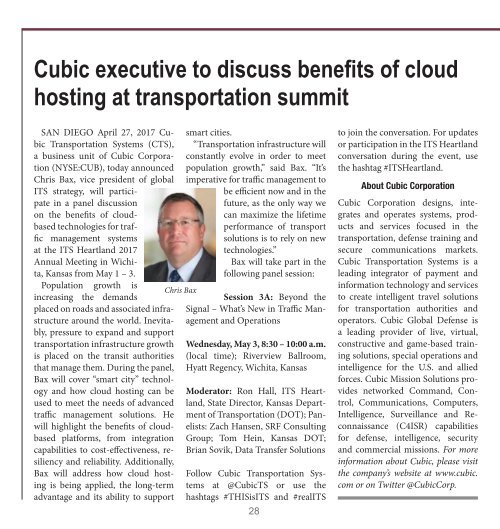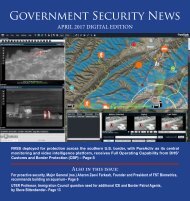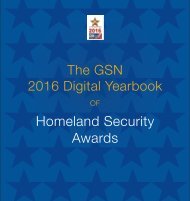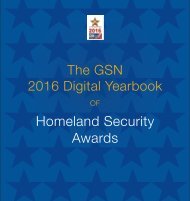GSN_Magazine April Digital Edition
Create successful ePaper yourself
Turn your PDF publications into a flip-book with our unique Google optimized e-Paper software.
Cubic executive to discuss benefits of cloud<br />
hosting at transportation summit<br />
JW Fishers describes equipment now<br />
used to locate weapons and explosives<br />
SAN DIEGO <strong>April</strong> 27, 2017 Cubic<br />
Transportation Systems (CTS),<br />
a business unit of Cubic Corporation<br />
(NYSE:CUB), today announced<br />
Chris Bax, vice president of global<br />
ITS strategy, will participate<br />
in a panel discussion<br />
on the benefits of cloudbased<br />
technologies for traffic<br />
management systems<br />
at the ITS Heartland 2017<br />
Annual Meeting in Wichita,<br />
Kansas from May 1 – 3.<br />
Population growth is<br />
increasing the demands<br />
placed on roads and associated infrastructure<br />
around the world. Inevitably,<br />
pressure to expand and support<br />
transportation infrastructure growth<br />
is placed on the transit authorities<br />
that manage them. During the panel,<br />
Bax will cover “smart city” technology<br />
and how cloud hosting can be<br />
used to meet the needs of advanced<br />
traffic management solutions. He<br />
will highlight the benefits of cloudbased<br />
platforms, from integration<br />
capabilities to cost-effectiveness, resiliency<br />
and reliability. Additionally,<br />
Bax will address how cloud hosting<br />
is being applied, the long-term<br />
advantage and its ability to support<br />
Chris Bax<br />
smart cities.<br />
“Transportation infrastructure will<br />
constantly evolve in order to meet<br />
population growth,” said Bax. “It’s<br />
imperative for traffic management to<br />
be efficient now and in the<br />
future, as the only way we<br />
can maximize the lifetime<br />
performance of transport<br />
solutions is to rely on new<br />
technologies.”<br />
Bax will take part in the<br />
following panel session:<br />
Session 3A: Beyond the<br />
Signal – What’s New in Traffic Management<br />
and Operations<br />
Wednesday, May 3, 8:30 – 10:00 a.m.<br />
(local time); Riverview Ballroom,<br />
Hyatt Regency, Wichita, Kansas<br />
Moderator: Ron Hall, ITS Heartland,<br />
State Director, Kansas Department<br />
of Transportation (DOT); Panelists:<br />
Zach Hansen, SRF Consulting<br />
Group; Tom Hein, Kansas DOT;<br />
Brian Sovik, Data Transfer Solutions<br />
Follow Cubic Transportation Systems<br />
at @CubicTS or use the<br />
hashtags #THISisITS and #realITS<br />
to join the conversation. For updates<br />
or participation in the ITS Heartland<br />
conversation during the event, use<br />
the hashtag #ITSHeartland.<br />
About Cubic Corporation<br />
Cubic Corporation designs, integrates<br />
and operates systems, products<br />
and services focused in the<br />
transportation, defense training and<br />
secure communications markets.<br />
Cubic Transportation Systems is a<br />
leading integrator of payment and<br />
information technology and services<br />
to create intelligent travel solutions<br />
for transportation authorities and<br />
operators. Cubic Global Defense is<br />
a leading provider of live, virtual,<br />
constructive and game-based training<br />
solutions, special operations and<br />
intelligence for the U.S. and allied<br />
forces. Cubic Mission Solutions provides<br />
networked Command, Control,<br />
Communications, Computers,<br />
Intelligence, Surveillance and Reconnaissance<br />
(C4ISR) capabilities<br />
for defense, intelligence, security<br />
and commercial missions. For more<br />
information about Cubic, please visit<br />
the company’s website at www.cubic.<br />
com or on Twitter @CubicCorp.<br />
Before 1970 the widely accepted solution<br />
for disposal of old munitions,<br />
typically called unexploded ordnance<br />
(UXO), was to dump them<br />
into rivers, lakes and oceans. Today<br />
we know this creates a multitude of<br />
problems, the worst of which are<br />
pollution and the risk of an explosion.<br />
Many people have already<br />
lost their lives to these underwater<br />
booby traps. The uncertainties<br />
surrounding their precise location<br />
and degree of decomposition,<br />
makes attempting to recover these<br />
dangerous devices an even more<br />
difficult task.<br />
Several international organizations<br />
have been formed to address<br />
the problem of UXO on land<br />
and underwater, and a variety of<br />
tools and techniques are being<br />
employed to locate and remove<br />
them. One of the groups working<br />
the problem is the Japan Mine Action<br />
Service (JMAS), a non-profit<br />
engaged in humanitarian activities<br />
to create better and safer living<br />
conditions. Since its inception in<br />
2001, JMAS has implemented UXO<br />
clearance projects in a host of countries<br />
from Japan to Afghanistan. JW<br />
Fishers Pulse 12 boat-towed metal<br />
detector is assisting in these operations.<br />
The detector will locate both<br />
ferrous and nonferrous metals, an<br />
important feature as munitions<br />
can be made of a variety of metals<br />
including brass and steel. It’s large<br />
rectangular search coil can find<br />
metal buried up to 16 feet, and the<br />
Pulse 12 works equally well on land<br />
and in the water. With three detection<br />
heads attached to the master<br />
control console, an area up to 72<br />
feet wide can be swept in one pass;<br />
28 29<br />
saving time, fuel, and manpower. To<br />
inspect sites on land, the coil can be<br />
mounted on the front of an ATV or<br />
other vehicle allowing large areas to<br />
be swept quickly. This powerful machine<br />
is now helping a JMAS team<br />
uncover lethal UXO in Palau reports<br />
representative Terada Yasuo.<br />
Another organization using<br />
Fishers equipment in a similar operation<br />
is the Regional Centre for<br />
Underwater De-mining (RCUD)<br />
in Montenegro, which was part of<br />
the former Yugoslavia. A bloody<br />
civil war in the 1990’s left the<br />
country littered with unexploded<br />
ordnance and waterways unsafe to<br />
travel because of many scattered<br />
mines. After numerous fishermen<br />
and boaters were killed from these<br />
deadly devices, RCUD acquired a<br />
Fisher side scan to help locate the<br />
mines. The operation was a success.<br />
With the help of the sonar<br />
and trained divers, many explosives<br />
were found and removed<br />
from the country’s lakes and rivers.<br />
Today the sonar is being used for<br />
more peaceful purposes. RCUD is<br />
working in cooperation with RPM<br />
Nautical Foundation and the Center<br />
for Conservation and Archaeology















